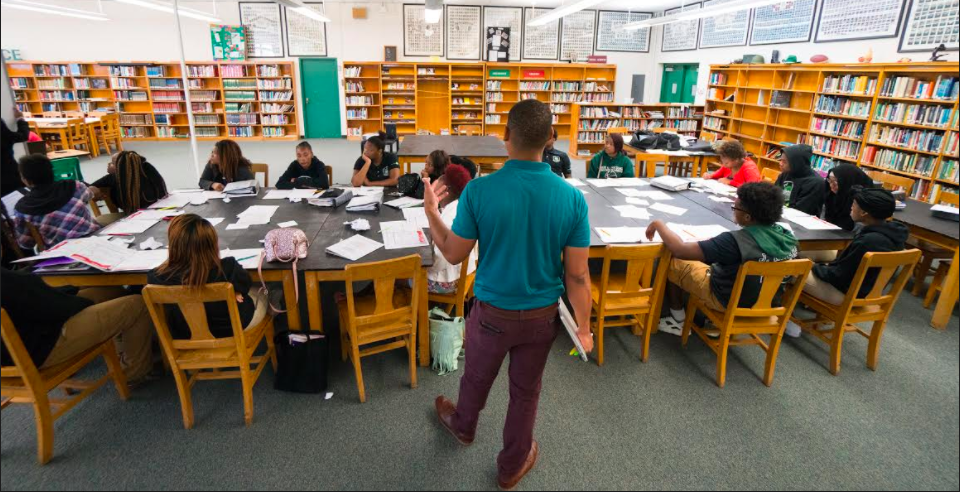Grinter: Delivering on the Promise of Dr. Martin Luther King Jr.’s Education Dream

An Education Dream, a new anthology by the Campaign for School Equity, with support from the National Civil Rights Museum, tells the story of education in Memphis in the 50 years since Dr. Martin Luther King Jr. was assassinated. The following is the preface to An Education Dream, which debuts today alongside a new interactive website, EducationDream.com.
Throughout his teachings and writings, Dr. Martin Luther King Jr. consistently asserted that a primary function of education in America is to serve as a vehicle for advancement or progress, that schools remain one of the single most historic routes to social mobility in this country, and that a quality education in and of itself is one of the foundational cornerstones of decent economic positioning for Black and poor people. Up until his death, Dr. King wrote profusely on the subject of equity and equality in education as one of the most important Civil Rights issues of his times. 50 years later, it still is.
Today, the education history and landscape in Memphis, much like everything else here, is one riddled with the questions many cities face: How do we ensure that the most vulnerable among us have the same access to opportunity and equity as everyone else? In a city that’s nearly 70% African-American, how can we ensure low-income students attending low-performing schools reach their fullest potential? How do we measure true progress? When do we get to declare victory?
Hard-hitting questions, I know. And yet, they are the questions that have driven some of the most ardent local leaders, advocates and reformers to great efforts, resulting in both satisfying successes and disappointing failures. The education landscape in Memphis is continually fed and supported by the tireless exertions of those same people, who in the end just want what’s best for children.
Campaign for School Equity was founded in 2016 with one purpose: to ensure that all children, especially those of color, have access to high-quality education choices. The city of Memphis, and others like it across the country, has made great advancements in raising graduation rates and in funding systems and processes that put students on a path to both enter and matriculate college. Yet, there is still so much work to be done.
Two years ago, when I came to Memphis to found Campaign for School Equity, I wasn’t so sure how I would go about planting myself and rooting the organization in this city’s rich, long and storied education history and legacy. But what I found was local ground that still remains fertile and fervent in its promise of delivering on An Education Dream in a manner befitting the original Dreamer.
This book is an opportunity for us to examine the education work in Memphis and fully tell its story in a way that grounds us in how far we’ve come since that harrowing evening of April 4, 1968, but also gives us a sense of how far we have to go and a renewed resolve to get there. This is a book generous in both its photo offerings and narrative from experts, chronicling the education history in Memphis within the bigger context of national turning points — from the groundbreaking Brown v. Board of Education of Topeka to the present-day school choice movement and education reform advocacy.
From concept to rendering, this book is a story that has been writing itself for more than five decades. I am only grateful that as Memphis prepares to commemorate the fiftieth anniversary of Dr. King’s death, a time of great reflection for the city, the space was created and the audience primed to finally receive it.
It is not always easy to look back, as the struggle for equity in education in Memphis is ongoing and often painful. But much in the same vein of Dr. King’s last book, Where Do We Go from Here: Chaos or Community? we must first ask ourselves the difficult questions: Where are we now? Where did we come from? Where are we going? And ultimately, who are we meant to be?
As we continue on with this work in the years or, perhaps, decades ahead, I believe that we must, as Dr. King contended, address inequity in education as a component of the greater infrastructure of exclusion that denies underserved Black and poor children access to roots of advancement in their education and their lives. By getting back to our reform roots and again framing our work in this way, we will stand a better chance of making Dr. King’s education dream a reality for all children in the near future.
Mendell Grinter is founder and executive director of Campaign for School Equity, a Memphis, Tennessee–based nonprofit that works to ensure that all children, especially those of color, and families in Tennessee have access to high-quality education choices by uniting communities of clergy, parents, and students to raise their voices to create effective change.
Get stories like these delivered straight to your inbox. Sign up for The 74 Newsletter

;)